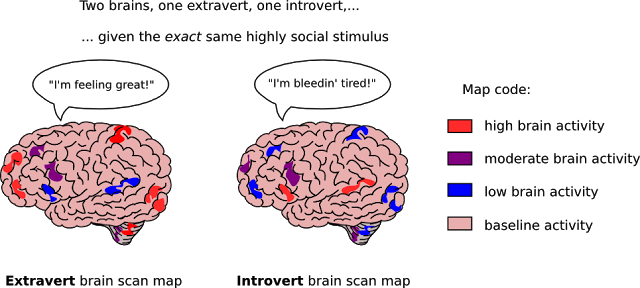How Introverts and Extroverts Are Different

By:
Introverts and extroverts don't always understand each other. But science has revealed physiological differences between the two that help explain their differences in behavior and shed light on our misconceptions about them both.
 Lady Geg's BlogSpot - blogspot.com
Lady Geg's BlogSpot - blogspot.com
An extroverted brain's dopamine reward system responds more actively than an introverted brain's to rewards such as money, sex, social status, and social affiliation, according to Scott Barry Kaufman, a psychologist and the scientific director of the Imagination Institute, in a recent video interview for introvert site Quiet Revolution. (Dopamine is a neurotransmitter that helps regulate rewards and pleasures in the brain.) This may explain why an extrovert shows more excitement in a social setting than an introvert.
RELATED: Why Do People Self-Sabotage?
"[Extroverts] get more energized by those things in their environment," Kaufman said. "Introverts, on the other hand, just don't get as energized. Their dopamine system is not as active when they see these kinds of things in the environment."
Misconceptions about introverts
By contrast, introverts might need more alone time to regain energy than extroverts. This doesn't mean that introverts are antisocial: People incorrectly view introverts as antisocial because introverts simply tend to be less gregarious than extroverts, Kaufman said. Introverts are still social beings; they just don't get as energized as their extroverted counterparts.
RELATED: What Negative Thinking Does to Your Brain
"[Introverts] may appear as though they have lower enthusiasm, for instance, but it doesn't mean that introverts are not social at all or aren't social beings," Kaufman said. "We're all social beings; it's the very fundamental aspect of human nature. It's just they're not as energized by environmental stimulation, sensory input, things of that nature."
Psychologically, the distinction between introversion and extroversion comes from the theories of psychiatrist C.G. Jung, who asserted that introverts gravitate towards their inner lives while extroverts are more interested in the outside world, Sophia Dembling, author of "The Introvert's Way: Living a Quiet Life in a Noisy World," told The Huffington Post in a 2013 interview.
“The description that introverts seem to relate most strongly to is the idea that Jung presented, that introverts are drained of energy by interaction and gain energy in solitude and quiet, whereas extroverts gain energy in social situations with interaction," Dembling said. "It seems to be most strongly an energy thing: where you get your energy and what takes it out of you.”
RELATED: What Stress Does To Your Brain
Dembling added that people also wrongly associate shyness with introversion. “The number one misconception about introversion is that it’s about shyness,” Dembling said. “The best distinction I’ve heard comes from a neuroscientist who studies shyness. He said, 'Shyness is a behavior: It’s being fearful in a social situation. Whereas introversion is a motivation. It’s how much you want and need to be in those interactions.'"
Misconceptions about extroverts
A common myth about extroverts is that they're inherently better leaders than introverts. It is true that nearly 100 percent of managers and executives report having extroverted qualities. But it's important to remember that extroverts are more likely to seek out these types of roles in the first place, according to Adam Grant, an author and a professor at the Wharton School of the University of Pennsylvania. That doesn't mean they're best suited for those roles.
RELATED: Here's Why It's so Important to Unplug
It's also wrong to think that extroverts want to be social all the time and have no shy tendencies. It's easy to assume that extroverts have an easier time networking and meeting new people than introverts. But the opposite could also be true because extroverts can be just as shy as introverts, Grant wrote.
"There are many shy extroverts: They’re uncomfortable interacting with strangers, but love going to rock concerts," Grant wrote. "And plenty of introverts are sociable: They’ll strike up a conversation with random people at parties, but get easily overwhelmed by bright lights and loud noises."
